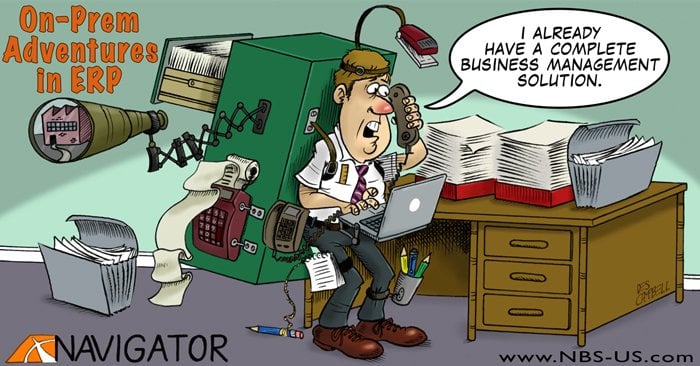
Large Companies Can’t Run Without ERP—and Neither Should Yours
Every business is different, and Fortune 500 companies are no exception. But all Fortune 500 companies do share something in common aside from scale and profitability: They all rely on enterprise resource planning software (ERP).
The reason that large firms all rely on ERP is because these systems are essential for efficient management of business data and processes; big business would come to a crashing halt if customer records were scattered among various software packages, accounting, financial and human resource data was decentralized, processes were not monitored or standardized, and areas such as inventory and shipping remained unconnected.
Much of what makes larger firms act like larger firms actually comes from having an ERP system in place.
What small and medium-sized businesses don’t always realize, however, is that they also should be using ERP.
Why SMBs Need ERP, Too
Large companies are not the only firms that can benefit from an ERP system. There are many reasons why SMBs with revenue in the $5 million to $10 million range also should have an ERP system in place.
1. A Single Source of Truth
The first and arguably most important reason why SMBs should be using an ERP system is because it centralizes a company’s data, creating a single source of truth.
By having all of a firm’s data in a single system, it is much easier to manage the data and ensure there are no discrepancies or data duplication. Pulling one set of data and integrating it with another, say inventory with sales, also is much easier when the data is all stored and accessed within the same system.
Access also can be controlled more precisely when a single system serves as the nerve-center for the business, and a common interface across all IT systems makes accessing the data easier (not to mention reducing operational silos).
2. Process Improvements and Automation
A second big reason that SMBs should have an ERP system in place is what it can do for business processes.
ERP is where process automation began, and modern ERP solutions help SMBs use their IT system for added efficiency with areas such as payroll, logistics, order fulfillment, shipping and tax calculations, supplier reorders and inventory management.
With ERP systems, SMBs also can establish and enforce standardized business processes that improve operations through best practices and reduce manual error.
3. Real-Time Visibility
Period-based reporting no longer is enough. The speed of business moves too quickly for anything less than real-time reporting and operational visibility. This is a third reason why SMBs should have an ERP system in place.
With all business data flowing into an ERP system in real-time, it is possible for employees and managers to always know what is going on with the business (the data being shown dependent on their role within the company, of course). Dashboards and access to real-time data speed up decision-making and lead to more informed choices, an essential for any firm with competition, fickle consumers or a network of suppliers and partners.
4. Complete Customer Management
When a firm is really small, it knows all its customers. As a business gets larger, however, a disconnect forms as multiple employees engage with customers at various touch points.
ERP helps businesses that have grown beyond a founder to effectively manage and unify customer data and interactions so there is a better and more informed customer interactions. With ERP, all customer data is centralized, and this data can be partially or fully exposed to each employee who interacts with a customer.
A better, more complete customer experience comes from having an ERP system in place, and the benefits of knowing the full range of interactions with a customer should not be underestimated. These benefits include buying history, upsell opportunities and past engagement, among others.
Now Available for All Businesses
One reason that larger firms rely on ERP and many smaller firms do not is that because historically SMBs could not afford ERP.
Sure, SMBs wanted the advantages that come with an ERP system, but they couldn’t invest in the implementation, software licensing and hardware that often ran in the millions of dollars.
That all changed with the emergence of cloud ERP, though. Cloud-based ERP solutions such as SAP Business One and SAP Business ByDesign have greatly eased the financial burden of an ERP system by removing the hardware and maintenance costs and greatly reducing the implementation costs through standardized cloud solutions. What used to require years of implementation and millions of dollars can now be rolled out in several months and as little as $50,000.
The subscription model used by cloud ERP solutions also enables SMBs to purchase just the amount of resources they need right now, and scale the system as the business grows.
Fortune 500 firms rely on ERP. Isn’t it time your SMB did, too?

